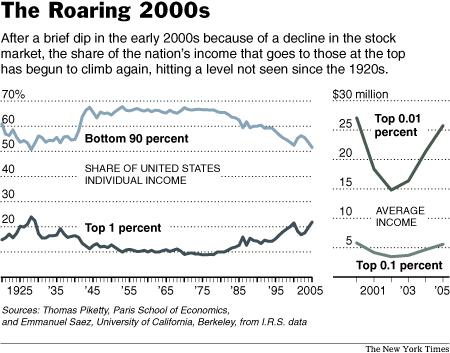Kenneth D. Lewis, the chief executive of Bank of America, took home more than $20 million in 2007. Of that, $5.75 million was in salary and bonuses.
Vikram Pandit, who became chief executive of Citigroup in December of 2007 and previously held other senior positions at the bank, made $3.1 million.
Richard Wagoner, the chief executive of General Motors, made $14.4 million, much of it in stock, options and other non-cash benefits. He earned a $1.6 million salary.
That's what they earned for mismanaging their corporations so badly that the federal government, using your tax dollars, has to come and get them bailed out.
But now the Obama administration is expected to impose a cap of $500,000 for top executives at companies that receive large amounts of bailout money.
Make sense. Long overdue.
And yet, there are detractors:
“That is pretty draconian — $500,000 is not a lot of money, particularly if there is no bonus,” said James F. Reda, founder and managing director of James F. Reda & Associates, a compensation consulting firm. “And you know these companies that are in trouble are not going to pay much of an annual dividend.”
Mr. Reda said only a handful of big companies pay chief executives and other senior executives $500,000 or less in total compensation. He said such limits will make it hard for the companies to recruit and keep executives, most of whom could earn more money at other firms.
“It would be really tough to get people to staff” companies that are forced to impose these limits, he said. “I don’t think this will work.”
“If I didn’t pay [bonuses], the people were going to go. … These people didn’t choose to cure cancer. These people didn’t choose to do public service work…These people chose to make money.” [Jack Welch, former CEO of General Electric]
“The consequences of it are going to be a massive brain drain of senior talent from those companies that have taken TARP money to those companies that have not.” [Donald Straszheim, managing principal at Straszheim Global Advisor]
“Companies that need the most talented people to fix their problems won’t be able to pay them.” [Jamie Dimon, JPMorgan Chase & Co. Chief Executive Officer]
Here's the thing. If, in these tough economic times, there exist executives who think it is good for a company that they receive $20 million in compensation, those executives are definitionally unqualified and shouldn't be hired in the first place. Especially if they created the tough economic times (for all of us!) in the first place!!!
And there's something else here. It's the unbelievable income inequality in this country.
In last Sunday’s Post, Robert Reich pointed out that the top 1% of the country possesses 20% of the nation’s income. Last time that happened? 1928. The top 10% possesses a full half of national income. Take some time to study this chart from the NYT:
In 2005, the bottom 90% made only half of the income generated in the United States. The top 10%, of course, made up the other half.
Trickle-down? Don't make me laugh. The Bush tax cuts, the very thing Republicans want to add more of to the stimulus bill, didn't help average Americans, or even above-average Americans. It created a class of uber-wealthy — which included the very same CEOs who got us into this economic mess in the first place.
So do I have sympathy for the CEO who will be forced to "only" make $500,000? Hell, no. And if the government won't limit CEO compensation, I think shareholders of these corporations should.
UPDATE: Steve Benen:
Maybe, and I'm just throwing this out there, we shouldn't care if this cap makes it difficult to keep failed executives on in their current posts.
I suspect there are plenty of sharp people in the business world, anxious to make a name for themselves, would who love the opportunity to get $500,000 to turn around a company facing collapse, with the possibility of a huge pay day down the road if they succeed.
If this is the big argument against "draconian" limits on executive compensation, it's an awfully good idea.
Yup.

